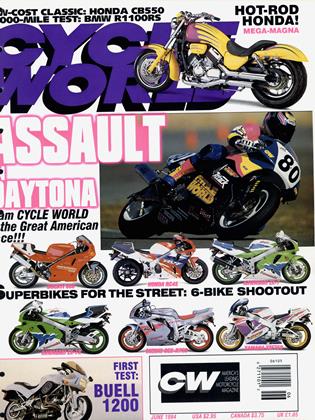FAST FREDDIE
A LEGEND LOOKS AHEAD
FREDDIE SPENCER HAS HEARD IT said that the best times are sometimes followed by the worst. He agrees with that notion, and knows of what he speaks.
"The way everything worked out in '83 and '85, winning three world championships, then what came after that... Spencer says, his voice trailing off. “It's definitely true, things can be so good and just as quickly turn bad.” Spencer now hopes good times pursue bad, after a 1993 GP season that was sabotaged by injuries. Nothing is concrete, but Spencer wants to run a few races this year, maybe the entire AMA Superbike season in 1995, then follow old rival Kenny Roberts into team ownership.
I m excited about being directly involved, owning a team,” Spencer says. “It will be great to share what I’ve learned and help another rider win championships." However successful Team Spencer may be, it will be virtually impossi ble to top his own on track success. Spencer was extraordinary. He came from Shreveport, Louisiana, and ripped through the GP world like
a gator through a bayou. In 1983, he was the youngest 500cc GP champion ever. Two years later, he won both the 500 and 250cc titles. Spencer’s championships put him in the record books, but along the way, he did something few masters of any craft can ever do. In winning, he redefined the art.
Roberts had led the way with the rear-tire slides to power out of corners, but Spencer showed everybody how to slide the front, or the rear, or both at the same time. The two styles and the two men waged war in ’83 for the world title. It was the 21-year-old against the old pro, and the decisive battle was fought in Sweden, towards the season’s end. A Spencer win would all but ice the title, and it was decided on one of the last comers. “We didn’t touch,” Spencer says emphatically of the storied encounter. “We did not touch. The thing is, we were coming into this right-hand comer and both of our lines were bad.” Gesturing with his hands, Spencer describes how his inside-out line met Roberts’ outside-in approach. Roberts went off the track as Spencer came out wide—the race was his. It was a moment and a season as intense as any.
Two years later, Spencer began to feel pain in his wrists. Countless races had frayed tendons. Taking a season off did little to help the problem. Spencer struggled to regain his old form, but something was missing. He returned to American Superbike racing in 1990-92, won two races and started enjoying the sport again.
“That was fun!” he says excitedly. “Even when it (GP racing) was going so well, it wasn’t really fun, with the pressure. But being able to win (in AMA Superbike), racing hard with guys like Scott Russell, Jamie James, all those guys. That was fun.”
Beyond having fun, Spencer had rounded himself back into shape, and was ready for another go at GPs. But a deal to lease a Honda NSR500 that would have paired him with Erv Kanemoto, his long-time friend and tuner, fell through. He did land a ride with a supposedly front-line Yamaha team, but crashes led to broken bones and an aborted comeback. Those injuries and others leave Spencer a little stiff on cold, wet Louisiana mornings, but he says he’s healthy now, ready to race.
As racing becomes more of a memory, it is also, Spencer believes, a source of insights he can share, for Spencer knows as well as anyone what it takes to be a winner.
“Maybe I have some natural talent and I thank God for that, but when it comes to pressure situations, that’s when you have to have the experience,” he says. “That experience is what I want to pass along.”
Robert Hough














